Unlock Success in Proposals with 32 Expertly Crafted Follow-up Letter Templates
Welcome to our Proposal Follow-up Letters page! We understand the importance of effective communication and staying connected throughout the proposal process. Our goal is to provide you with a comprehensive collection of professionally crafted follow-up letter templates that will help you navigate various scenarios and enhance your chances of success. Whether you’re seeking to acknowledge proposal submissions, request revisions, or confirm important details, our collection covers a wide range of follow-up needs. With our expertly designed templates and helpful tips, you can streamline your follow-up efforts, maintain strong relationships with clients and stakeholders, and maximize your chances of achieving your desired outcomes. Explore our collection of Proposal Follow-up Letters and take your follow-up game to the next level!
Tips for Effective Follow-up Strategies
- Set Timelines: Establish a clear timeline for your follow-up activities. Determine appropriate intervals between follow-ups to avoid being too pushy or too passive. Consider the urgency of the situation and the expectations of the recipient when deciding on the timing.
- Use Multiple Communication Channels: Utilize various communication channels for your follow-up efforts. Depending on the recipient’s preferences and availability, consider sending follow-up emails, making phone calls, or scheduling in-person meetings. Adapt your approach based on what will be most effective for each specific situation.
- Maintain a Polite and Professional Tone: Ensure that your follow-up communication maintains a polite and professional tone. Be respectful and courteous in your language and avoid coming across as demanding or impatient. Demonstrate your professionalism and genuine interest in the recipient’s response.
- Personalize Your Follow-up Messages: Customize each follow-up message to the recipient and their specific needs or concerns. Refer to previous discussions or interactions to show that you have paid attention to their requirements. Personalization helps to establish a stronger connection and increases the likelihood of receiving a response.
- Nurture Ongoing Relationships: Follow-up efforts shouldn’t be limited to a single interaction. Continuously nurture your relationships with clients or stakeholders by staying in touch even after the initial follow-up. Regularly provide updates, share relevant resources or information, and seek opportunities for collaboration. Building and maintaining relationships will lead to stronger engagement and better long-term outcomes.
- Provide Value in Your Follow-ups: Each follow-up should offer something valuable to the recipient. Provide additional information, address any concerns or questions, or offer relevant insights that showcase your expertise. Make it clear how your follow-up adds value and helps the recipient in their decision-making process.
- Keep Track of Follow-up Activities: Maintain organized records of your follow-up activities. Use tools or systems to track when follow-ups were sent, the nature of the follow-up, and any responses received. This helps you stay on top of your follow-up efforts and ensures that no important interactions fall through the cracks.
- Follow-Up Even in the Absence of a Response: Don’t be discouraged if you don’t receive an immediate response. Persistence is key in follow-up strategies. Even if you haven’t received a response, continue to follow up at appropriate intervals. It shows your dedication and commitment to the proposal or project.
- Evaluate and Adapt: Regularly evaluate the effectiveness of your follow-up strategies. Assess what is working well and what could be improved. Pay attention to response rates and feedback from recipients. Adjust your approach as needed to optimize your follow-up efforts.
#1: Request for In-person Meeting:
The purpose of this follow-up letter is to express the sender’s interest in scheduling an in-person meeting with the recipient. It serves as a formal request to discuss important matters face-to-face, allowing for more effective communication, collaboration, and the opportunity to address any outstanding issues or questions. The sender aims to emphasize the significance of meeting in person and the value it can bring to furthering their mutual objectives or resolving any concerns.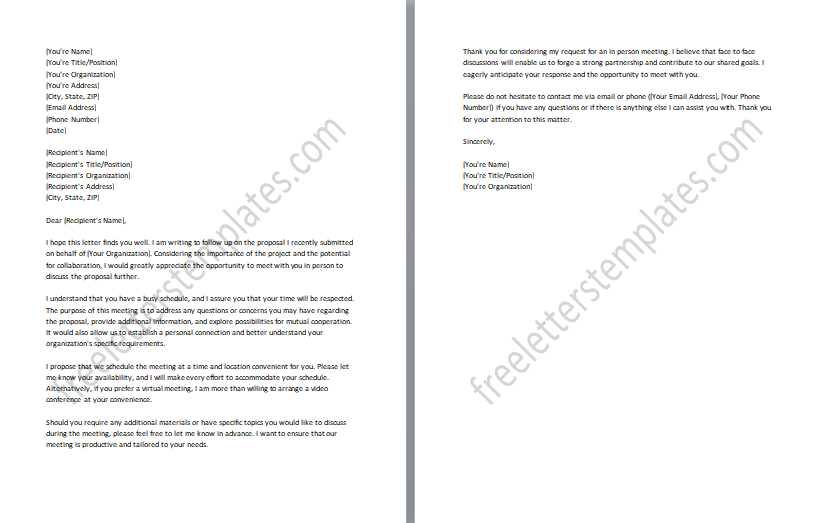
#2: Grateful Acknowledgment of the Proposal:
The purpose of the “Grateful Acknowledgment for the Proposal Follow-up Letter” is to sincerely thank the recipient for taking the time to review the proposal. The sender wants to express genuine appreciation for the opportunity to present the proposal and recognizes the recipient’s effort in carefully evaluating it. The letter aims to maintain a positive and professional relationship, regardless of whether the proposal is accepted or not. It serves as a kind and thoughtful way to show gratitude and continue the connection with the recipient.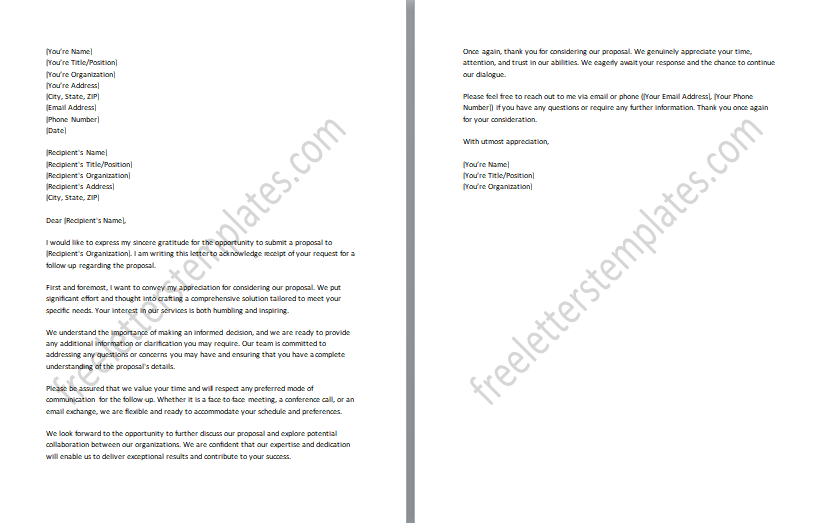
#3: Proposal Acceptance and Next Steps:
This letter serves as a formal response from the sender to accept the recipient’s proposal. It expresses the sender’s enthusiasm and acceptance of the proposed ideas, terms, and conditions. The purpose of the letter is to outline the next steps and discuss the necessary actions to move forward with the accepted proposal. It provides a clear roadmap for the implementation process, including timelines, responsibilities, and any additional requirements or agreements. The letter aims to establish effective communication and collaboration between the sender and the recipient, ensuring a smooth transition from proposal acceptance to project execution.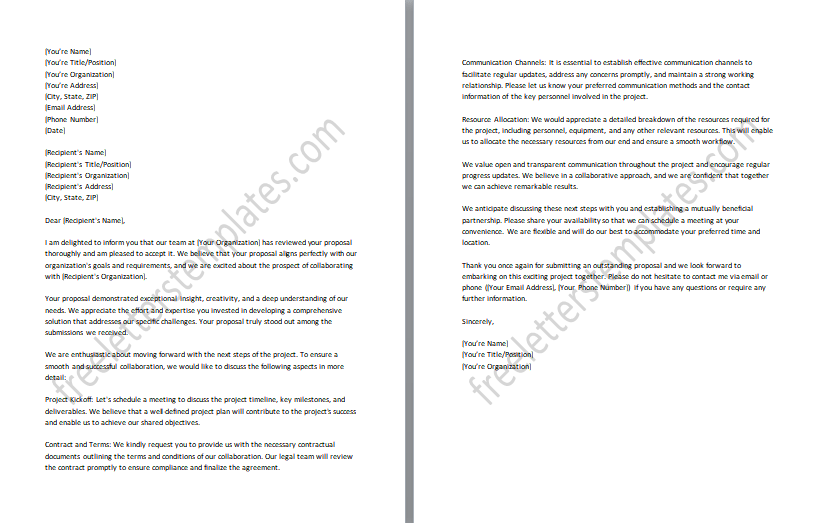
#4: Regretful Rejection of the Proposal:
The purpose of the “Regretful Rejection of the Proposal Follow-up Letter” is to inform the recipient that the sender has made the difficult decision to decline their proposal. The letter expresses genuine regret and acknowledges the effort and thoughtfulness put into the proposal. It aims to maintain a respectful and professional relationship despite the rejection. The letter may provide brief, constructive feedback or reasons for the rejection, while also emphasizing the possibility of future collaboration or encouraging the recipient to submit future proposals. The sender’s tone is empathetic, understanding the disappointment the recipient may feel, and they strive to convey appreciation for the recipient’s efforts and their ongoing partnership.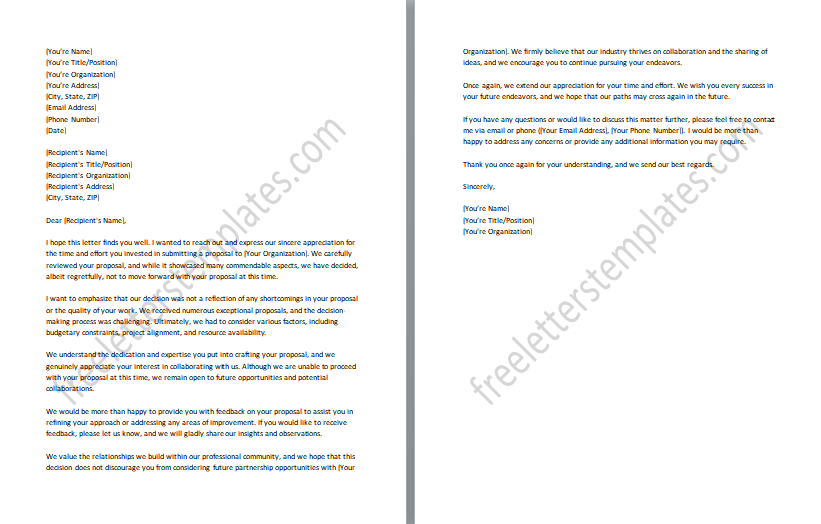
#5: Proposal Revision Request and Deadline Extension:
The purpose of the “Proposal Revision Request and Deadline Extension Follow-up Letter” is to request the recipient to revise their proposal and extend the deadline for submission. The letter acknowledges the initial proposal while highlighting the need for further improvements or adjustments. It emphasizes the importance of a collaborative approach and the desire to work together to ensure a stronger and more compelling proposal. The letter also presents a clear request for an extension of the deadline to provide sufficient time for the necessary revisions. The sender’s tone is cooperative and understanding, emphasizing the mutual benefit of a revised proposal and the willingness to support the recipient throughout the process.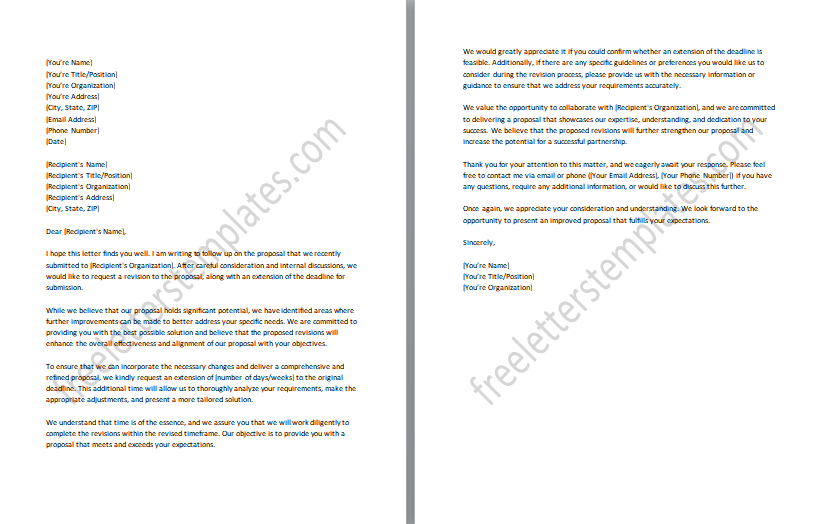
#6: Urgent Proposal Deadline Extension Request:
The purpose of the “Urgent Proposal Deadline Extension Request Follow-up Letter” is to urgently request an extension for the proposal submission deadline. The letter acknowledges the initial deadline while highlighting the need for additional time due to unforeseen circumstances or challenges faced by the sender. It emphasizes the urgency of the situation and the importance of ensuring a thorough and high-quality proposal. The letter presents a clear and compelling request for the recipient to grant the extension, highlighting the potential impact on the proposal’s success if more time is not provided. The sender’s tone is urgent yet respectful, conveying the importance of the matter and the appreciation for the recipient’s consideration and understanding.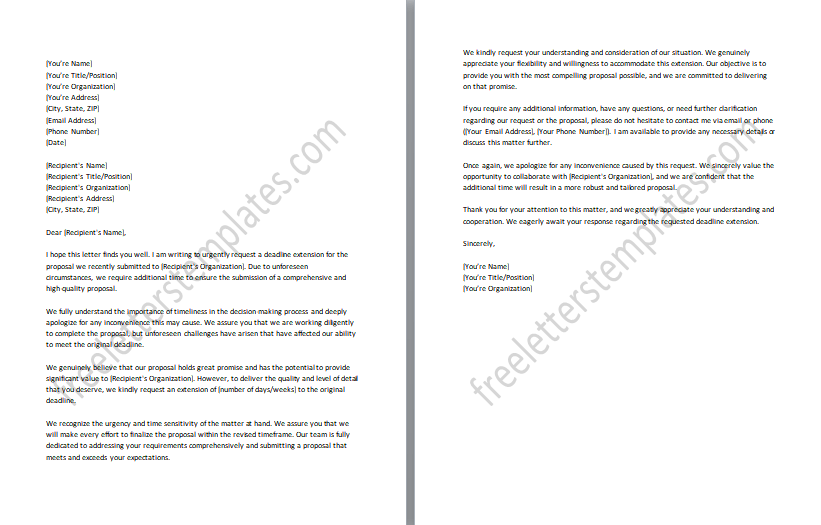
#7: Progress Update on Proposal Evaluation:
The purpose of the “Progress Update on Proposal Evaluation Follow-up Letter” is to provide the recipient with a status update regarding the evaluation of their proposal. The letter acknowledges the receipt of the proposal and expresses gratitude for the opportunity to review it. It aims to keep the recipient informed about the progress of the evaluation process, whether it is still ongoing or nearing completion. The letter may provide an estimated timeline for when the final decision or feedback will be provided. It emphasizes the sender’s commitment to a thorough evaluation and assures the recipient that their proposal is being given due consideration. The sender’s tone is professional, transparent, and appreciative, highlighting the importance of effective communication during the evaluation stage.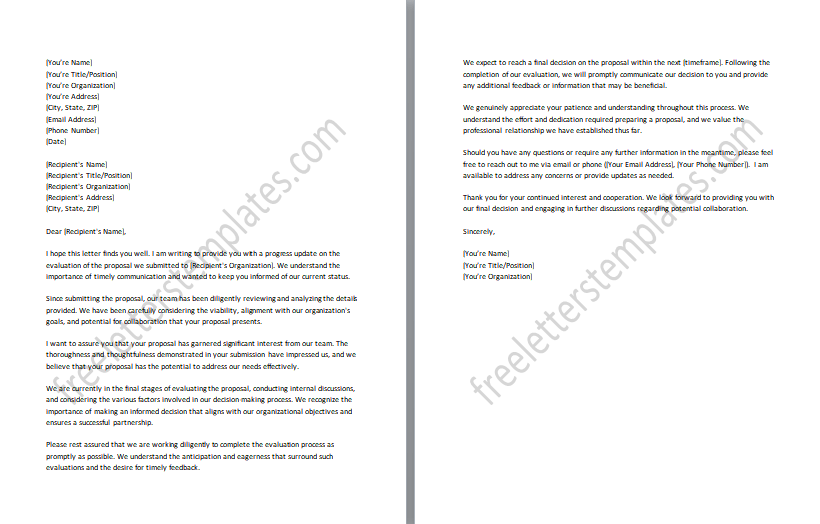
#8: Request for Proposal Presentation:
The purpose of the “Request for Proposal Presentation Follow-up Letter” is to request the recipient to schedule a presentation for their proposal. The letter acknowledges the submission of the proposal and expresses the sender’s desire to provide a more detailed presentation to further explain and showcase their ideas. It emphasizes the benefits of a face-to-face presentation in facilitating a deeper understanding of the proposal’s merits. The letter may suggest potential dates and times for the presentation, or it may request the recipient to provide their availability. The sender’s tone is enthusiastic, persuasive, and focused on demonstrating the value of a presentation in securing the recipient’s interest and support for the proposal.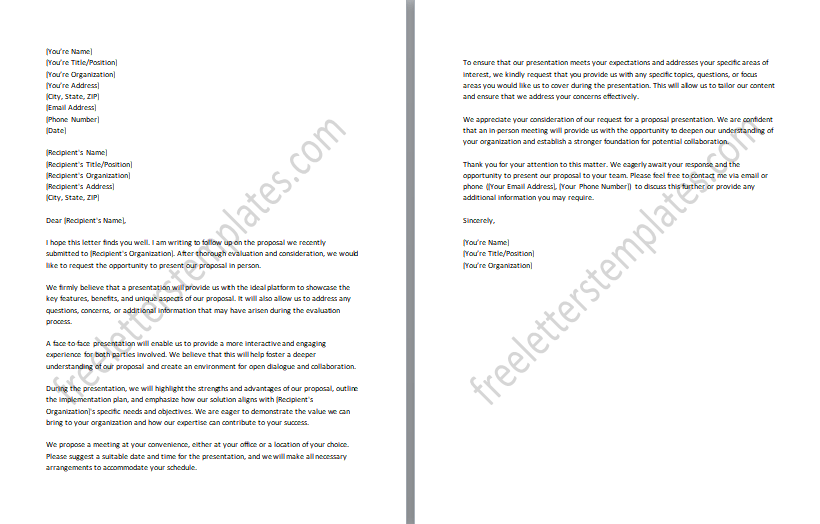
#9: Proposal Contract Negotiation Progress:
The purpose of the “Proposal Contract Negotiation Progress Follow-up Letter” is to provide an update on the progress of contract negotiations following the submission of the proposal. The letter acknowledges the recipient’s interest in the proposal and expresses the sender’s commitment to advancing the negotiation process. It aims to inform the recipient about the current status of the contract negotiations, including any discussions, modifications, or agreements that have taken place thus far. The letter may highlight specific terms or conditions that require further attention or clarification. The sender’s tone is proactive, cooperative, and focused on fostering open communication to ensure a mutually beneficial contract agreement is reached.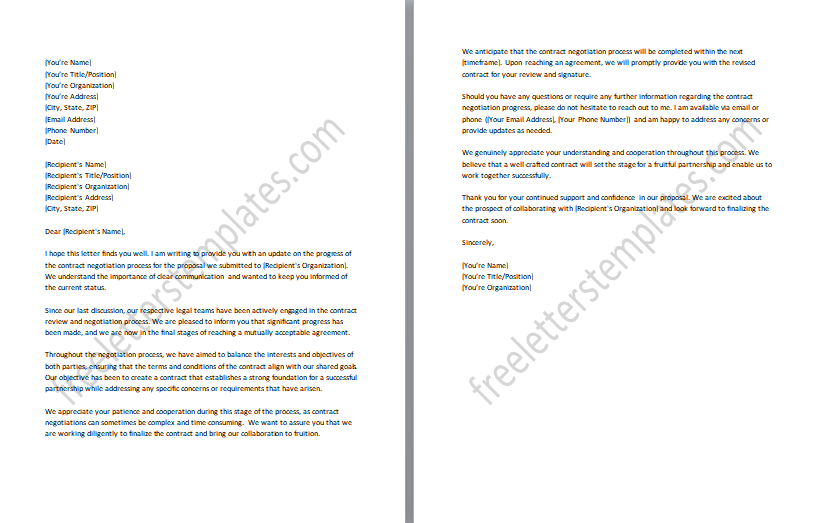
#10: Proposal Funding Confirmation and Payment Details:
The purpose of the “Proposal Funding Confirmation and Payment Details Follow-up Letter” is to confirm the availability of funding for the proposed project and provide the recipient with essential payment details. The letter acknowledges the recipient’s successful proposal and expresses appreciation for their efforts. It emphasizes that the necessary funding has been secured for the project, ensuring its viability and implementation. The letter provides specific information regarding the payment process, including payment schedules, methods, and any relevant terms or conditions. It aims to instill confidence in the recipient by demonstrating the sender’s commitment to fulfilling financial obligations promptly and professionally. The sender’s tone is reassuring, detailed, and focused on ensuring a smooth financial transition for the project’s initiation.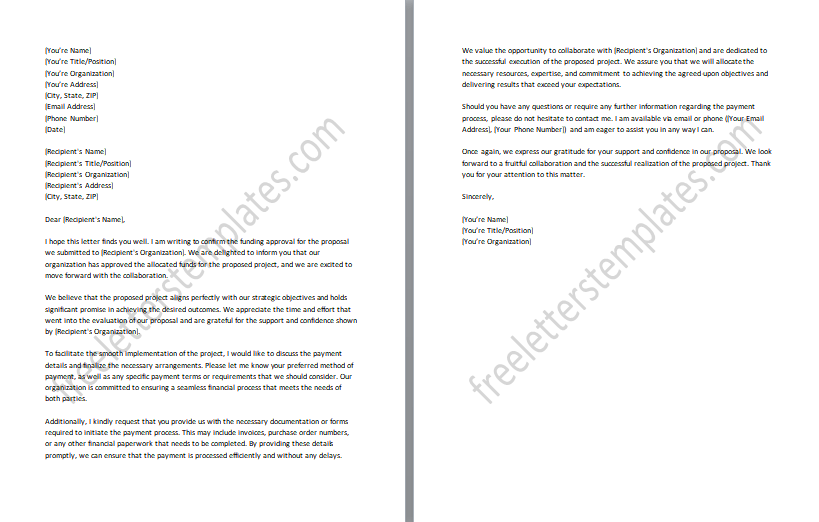
#11: Proposal Implementation Plan Confirmation:
The purpose of the “Proposal Implementation Plan Confirmation Follow-up Letter” is to confirm the agreed-upon implementation plan for the proposed project. The letter acknowledges the recipient’s accepted proposal and expresses enthusiasm for moving forward with the project’s execution. It aims to provide a comprehensive overview of the implementation plan, including key milestones, deliverables, timelines, and assigned responsibilities. The letter may also address any additional details or specific requirements necessary for a successful implementation. The sender’s tone is organized, proactive, and focused on ensuring a shared understanding of the project’s implementation plan, fostering a collaborative and efficient working relationship between the sender and the recipient.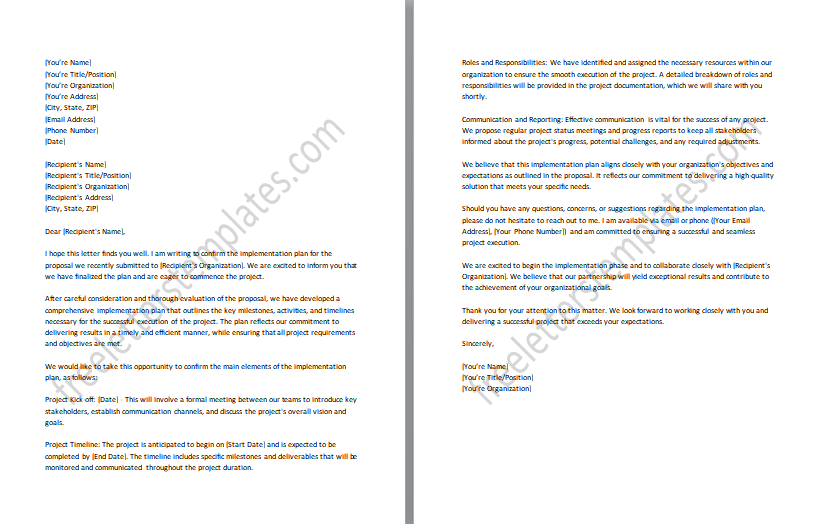
#12: Additional Clarification Request on the Proposal:
The purpose of the “Additional Clarification Request on the Proposal Follow-up Letter” is to seek further clarification on specific aspects of the recipient’s proposal. The letter acknowledges the recipient’s submission of the proposal and expresses appreciation for their effort. It aims to address areas where additional information or clarification is required to fully evaluate the proposal. The letter highlights the importance of clear understanding and emphasizes the sender’s commitment to making an informed decision. It may include specific questions or requests for the recipient to provide more details or elaborate on certain points. The sender’s tone is respectful, inquisitive, and focused on ensuring a comprehensive evaluation of the proposal for a well-informed decision-making process.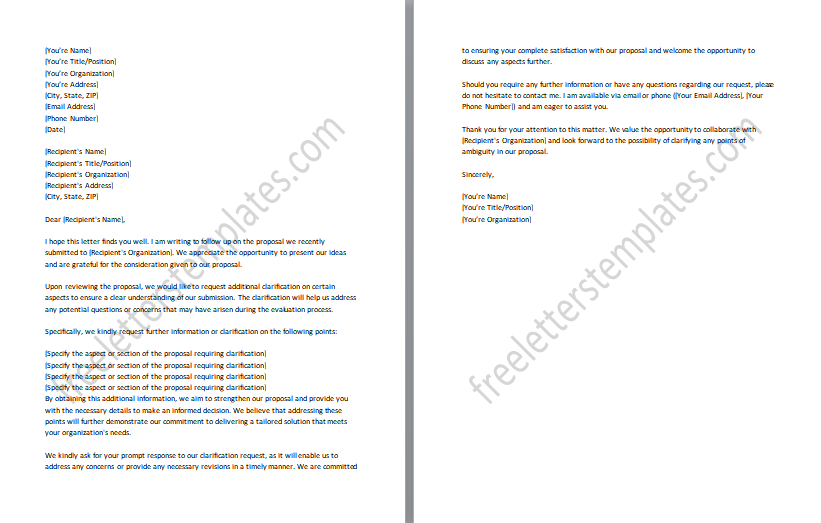
#13: Detailed Cost Breakdown Request for the Proposal:
The purpose of the “Detailed Cost Breakdown Request for the Proposal Follow-up Letter” is to request a comprehensive breakdown of the costs included in the recipient’s proposal. The letter acknowledges the submission of the proposal and expresses appreciation for the effort put into it. It aims to obtain a detailed understanding of the financial aspects of the proposal by requesting a thorough breakdown of the costs, including itemized expenses, labor costs, materials, and any other relevant financial considerations. The letter emphasizes the importance of transparency and accuracy in evaluating the proposal’s financial feasibility. The sender’s tone is professional, inquisitive, and focused on ensuring a clear understanding of the financial implications of the proposed project.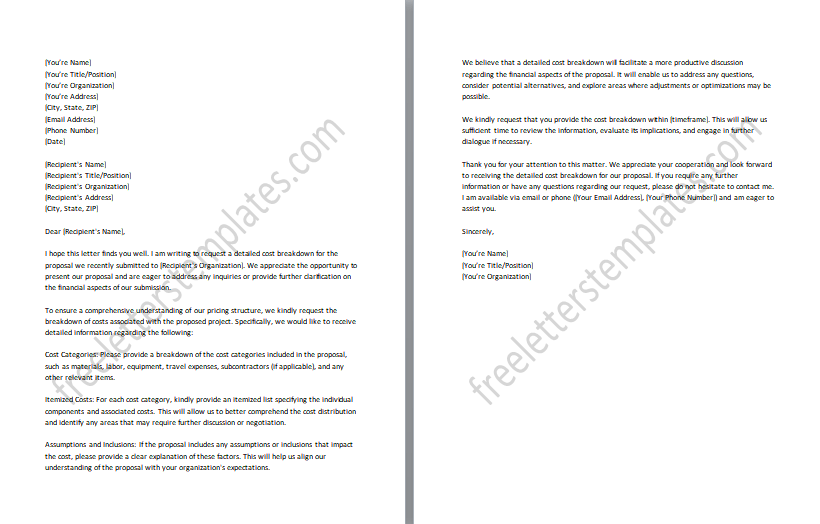
#14: Proposal Timeline Adjustment Confirmation:
The purpose of the “Proposal Timeline Adjustment Confirmation Follow-up Letter” is to confirm and communicate changes to the timeline proposed in the initial proposal. The letter acknowledges the recipient’s submitted proposal and expresses the need for adjustments to the originally proposed timeline. It aims to provide a clear and updated timeline that reflects the revised schedule for the project’s completion. The letter may outline the reasons for the timeline adjustment, such as unforeseen circumstances or additional requirements. It emphasizes the importance of maintaining a realistic and achievable timeframe for successful project implementation. The sender’s tone is informative, considerate, and focused on ensuring a shared understanding of the updated timeline among all relevant parties involved in the project.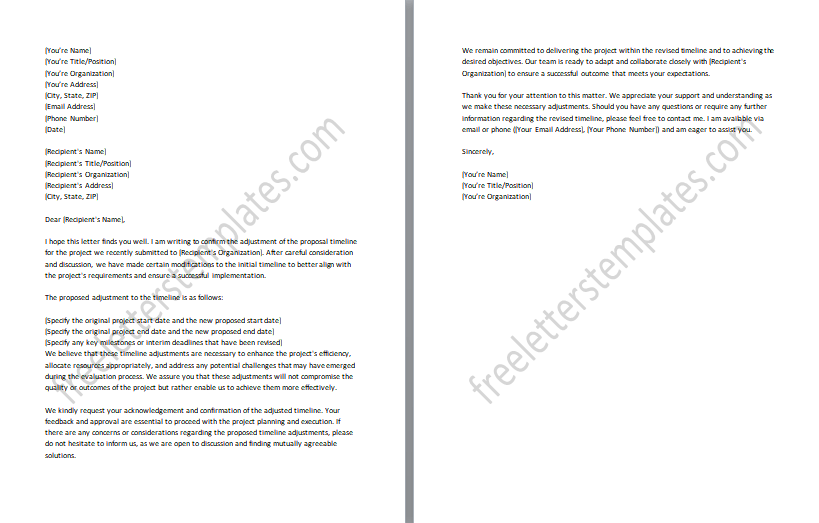
#15: Confirmation of Collaboration in the Proposal:
The purpose of the “Confirmation of Collaboration in the Proposal Follow-up Letter” is to confirm the sender’s interest and commitment to collaborating with the recipient based on the submitted proposal. The letter acknowledges the recipient’s proposal and expresses enthusiasm for the potential collaboration. It aims to affirm the alignment of goals, values, and objectives between the sender and the recipient. The letter may highlight specific areas of collaboration, such as joint project implementation, resource sharing, or knowledge exchange. It emphasizes the mutual benefits and opportunities that can be achieved through collaboration. The sender’s tone is positive, supportive, and focused on establishing a strong foundation for a successful partnership based on the proposal’s shared vision.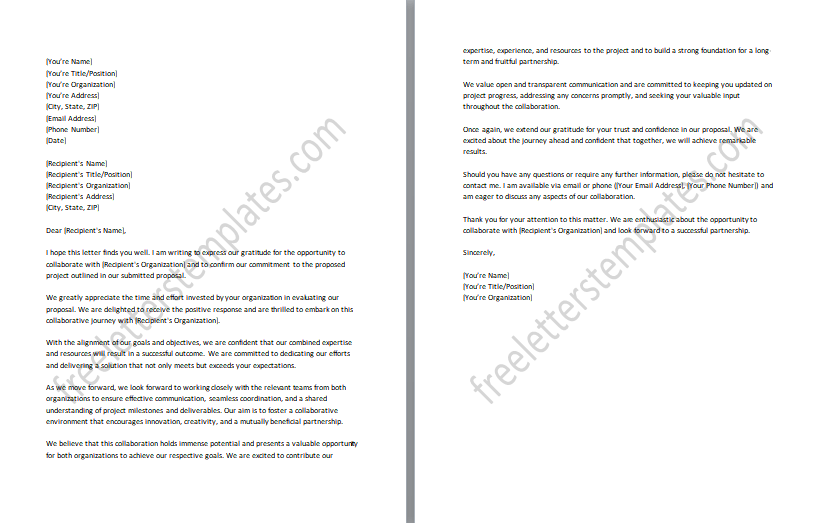
#16: Request for Follow-up Meeting to Discuss:
The purpose of the “Request for Follow-up Meeting to Discuss Proposal Further Letter” is to request a meeting with the recipient to delve deeper into the details of the proposal. The letter acknowledges the recipient’s submitted proposal and expresses the sender’s eagerness to engage in a meaningful discussion. It aims to foster open dialogue, exchange ideas, and address any questions or concerns that may have arisen during the evaluation process. The letter highlights the importance of direct interaction to enhance understanding, explore potential synergies, and facilitate decision-making. The sender’s tone is friendly, collaborative, and focused on building a strong rapport and ensuring a productive meeting that moves the proposal forward.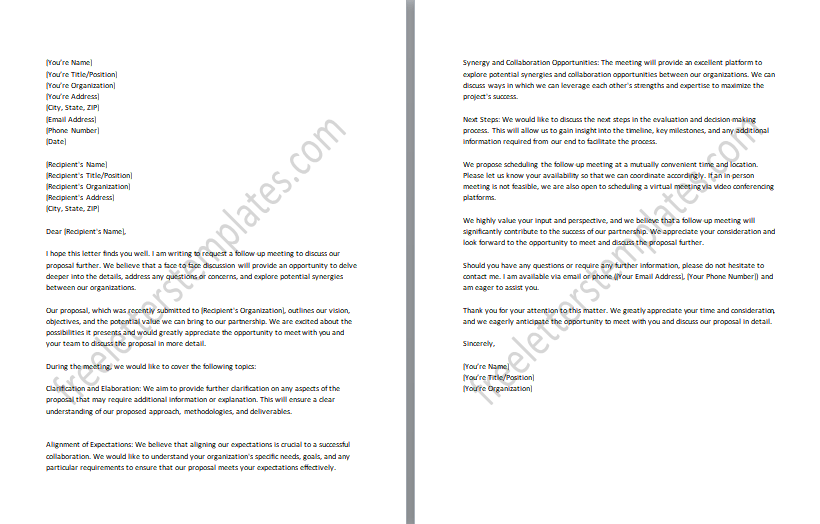
#17: Request for Follow-up Phone Call to Discuss Proposal:
The purpose of the “Request for Follow-up Phone Call to Discuss Proposal Further Letter” is to request a phone call with the recipient to have a more in-depth discussion about the proposal. The letter acknowledges the recipient’s submitted proposal and expresses the sender’s interest in engaging in a conversation to explore the proposal in more detail. It aims to facilitate direct communication, allowing for immediate clarification, exchange of ideas, and addressing any questions or concerns. The letter highlights the convenience and efficiency of a phone call to discuss the proposal further. The sender’s tone is cordial, proactive, and focused on establishing effective communication to ensure a comprehensive understanding of the proposal and to move forward in the decision-making process.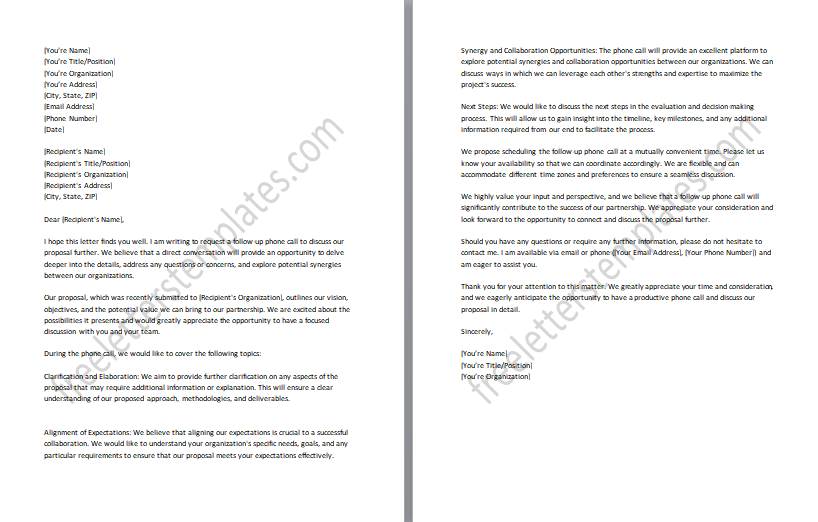
#18: Gentle Reminder Email for Proposal:
The purpose of the “Gentle Reminder Email for Proposal Follow-up Letter” is to kindly remind the recipient about the pending follow-up on the proposal. The email acknowledges the submission of the proposal and expresses appreciation for the recipient’s time and effort. It aims to gently prompt the recipient to provide an update or take necessary actions related to the proposal. The email may include a brief recap of the proposal’s key points and reiterate the importance of the follow-up. The tone of the email is friendly, polite, and understanding, ensuring that the reminder is conveyed in a courteous manner without pressuring the recipient.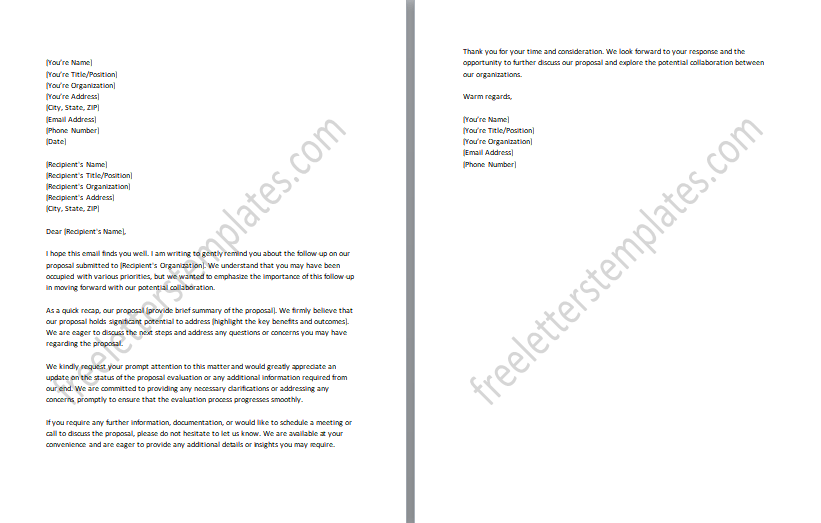
#19: Final Decision Notification on the Proposal:
The purpose of the “Final Decision Notification on the Proposal Follow-up Letter” is to officially communicate the final decision regarding the submitted proposal to the recipient. The letter acknowledges the recipient’s effort in preparing and submitting the proposal and expresses gratitude for their interest in the opportunity. It aims to provide clear and concise notification of the final decision, whether it is acceptance, rejection, or any other outcome. The letter may briefly explain the rationale behind the decision or offer feedback to help the recipient understand the evaluation process. The tone of the letter is professional, respectful, and considerate, recognizing the recipient’s investment in the proposal and conveying the sender’s sincere appreciation for their contribution.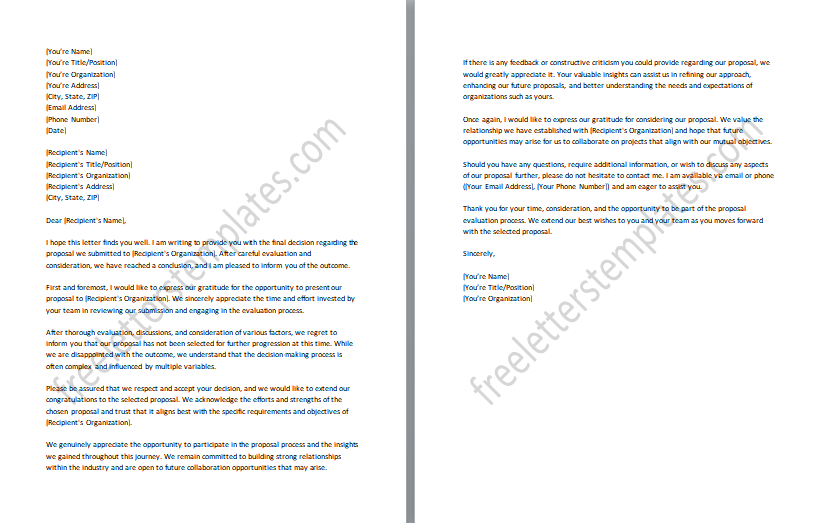
#20: Request for Feedback on the Proposal:
The purpose of the “Request for Feedback on the Proposal Follow-up Letter” is to solicit feedback from the recipient regarding the submitted proposal. The letter acknowledges the recipient’s time and consideration in reviewing the proposal and expresses the sender’s interest in receiving their valuable insights. It aims to create an opportunity for the recipient to provide constructive feedback, suggestions, or observations to further improve the proposal or address any areas of concern. The letter emphasizes the sender’s commitment to continuous improvement and openness to receiving feedback for future collaborations. The tone of the letter is appreciative, receptive, and focused on fostering a productive dialogue that enhances the quality and effectiveness of the proposal.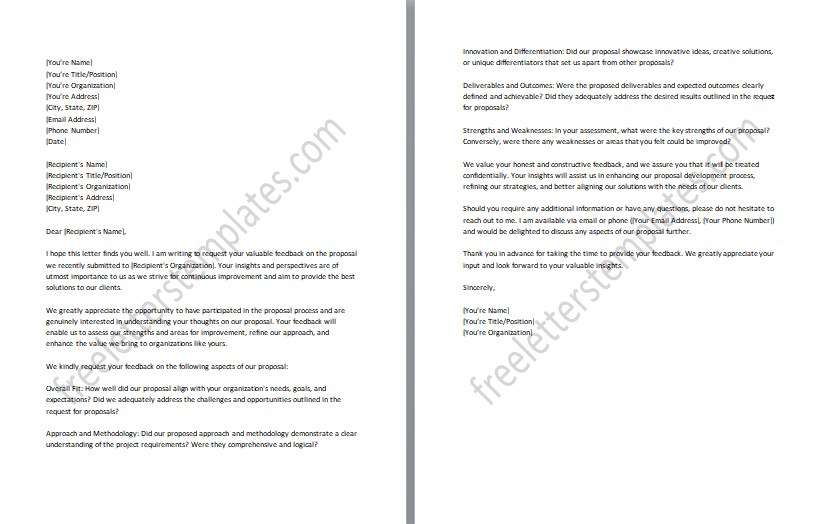
#21: Progress Update on Proposal:
The purpose of the “Progress Update on Proposal Follow-up Letter” is to provide the recipient with an update on the progress made regarding the submitted proposal. The letter acknowledges the recipient’s interest in the proposal and aims to keep them informed about the advancements and developments since its submission. It may include information about the evaluation process, any additional requirements or requests for clarification, or updates on the timeline for decision-making. The letter emphasizes the sender’s commitment to keeping the recipient updated and maintaining transparent communication throughout the proposal evaluation phase. The tone of the letter is informative, proactive, and focused on ensuring that the recipient is kept abreast of the progress made on the proposal.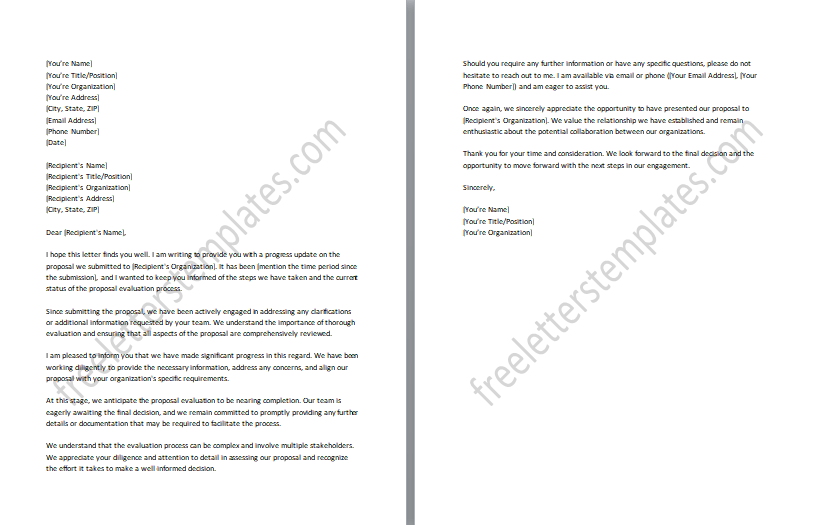
#22: Inquiry on Proposal Follow-up Status Letter:
The purpose of the “Inquiry on Proposal Follow-up Status Letter” is to inquire about the current status of the submitted proposal. The letter acknowledges the recipient’s receipt of the proposal and expresses the sender’s interest in obtaining an update on its evaluation or review process. It aims to seek information regarding the progress, any decision timelines, or any additional steps required from the sender’s end. The letter emphasizes the sender’s eagerness to receive an update to plan their next steps accordingly. The tone of the letter is polite, inquisitive, and focused on obtaining a clear understanding of the proposal’s status, ensuring effective communication and timely responses between the sender and the recipient.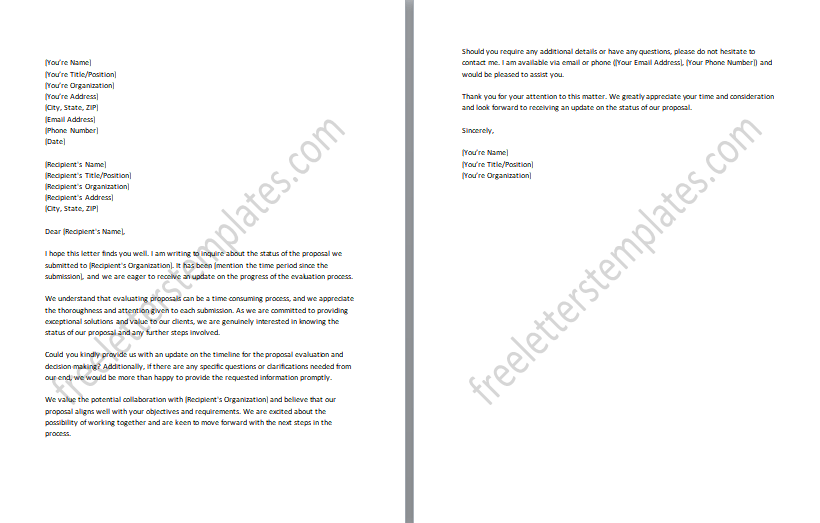
#23: Proposal Follow-up for Contract Signing Arrangements:
The purpose of the “Proposal Follow-up for Contract Signing Arrangements Letter” is to initiate the process of finalizing the contract after the acceptance of the proposal. The letter acknowledges the recipient’s acceptance of the proposal and expresses the sender’s readiness to proceed with the contract signing. It aims to outline the necessary steps and arrangements required to facilitate the contract signing process, such as scheduling a meeting, specifying the location, or providing any additional documentation or information. The letter emphasizes the importance of prompt contract signing to formalize the agreement and commence the proposed project. The tone of the letter is professional, proactive, and focused on ensuring a smooth transition from proposal acceptance to contract finalization.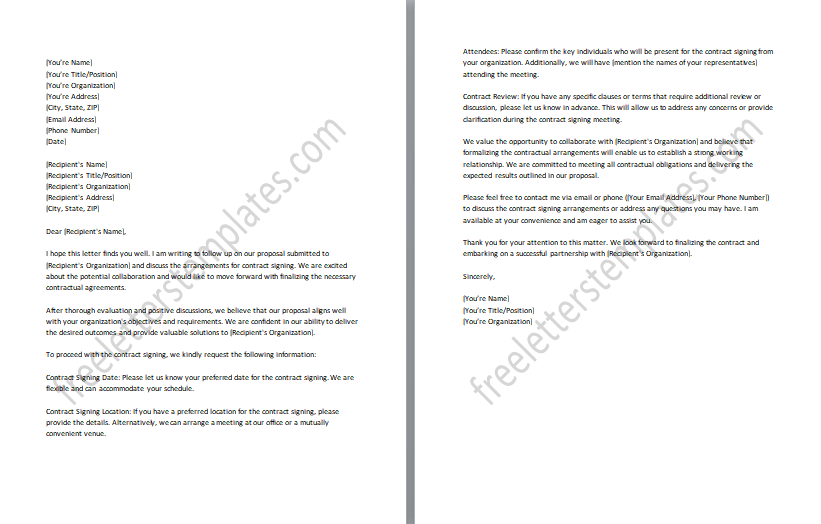
#24: Budget Approval Confirmation for the Proposal:
The purpose of the “Budget Approval Confirmation for the Proposal Follow-up Letter” is to officially confirm the approval of the proposed budget outlined in the submitted proposal. The letter acknowledges the recipient’s effort in preparing the proposal and expresses appreciation for their thorough financial planning. It aims to notify the recipient that their proposed budget has been approved and that the necessary funds will be allocated accordingly. The letter may provide details about the approved budget, any specific conditions or adjustments made, and the next steps in the financial process, such as payment procedures or reimbursement guidelines. The tone of the letter is professional, congratulatory, and focused on assuring the recipient that their budget has been carefully reviewed and accepted.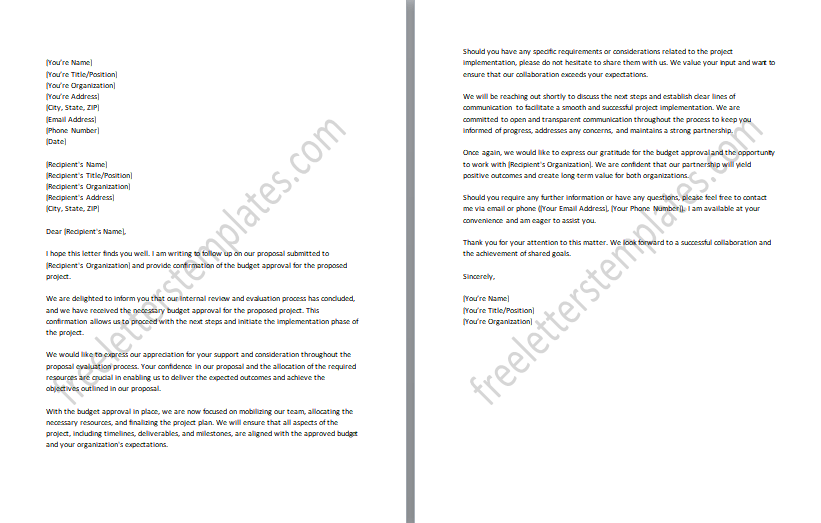
#25: Project Kickoff Schedule Confirmation for the Proposal:
The purpose of the “Project Kickoff Schedule Confirmation for the Proposal Follow-up Letter” is to confirm the schedule and date for the official kickoff of the proposed project. The letter acknowledges the recipient’s acceptance of the proposal and expresses excitement for the upcoming project commencement. It aims to provide a detailed schedule of the project kickoff, including the specific date, time, and location, if applicable. The letter may also outline any necessary preparations or requirements for the kickoff meeting or event. It emphasizes the importance of starting the project on time and aligning all relevant stakeholders for a successful launch. The tone of the letter is enthusiastic, organized, and focused on ensuring that all parties involved are aware of and prepared for the project kickoff.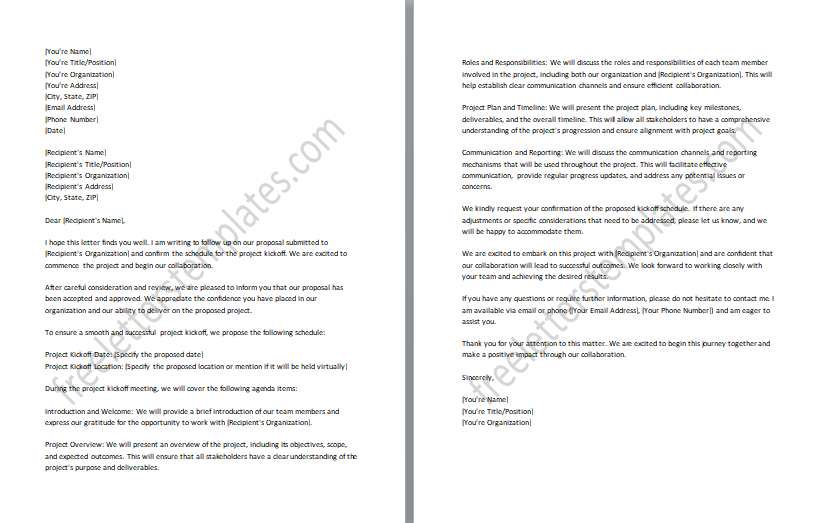
#26: Resource Allocation Update for the Proposal:
The purpose of the “Resource Allocation Update for the Proposal Follow-up Letter” is to provide the recipient with an update on the allocation of resources for the proposed project. The letter acknowledges the recipient’s submitted proposal and expresses appreciation for their resource requirements. It aims to communicate any updates or adjustments made to the allocation of resources, such as personnel, equipment, or funding. The letter may outline the specific changes, reasons for the updates, and any potential impacts on the project timeline or deliverables. It emphasizes the sender’s commitment to optimizing resource utilization and ensuring that the project has the necessary resources for success. The tone of the letter is informative, proactive, and focused on maintaining transparency and effective resource management throughout the project implementation.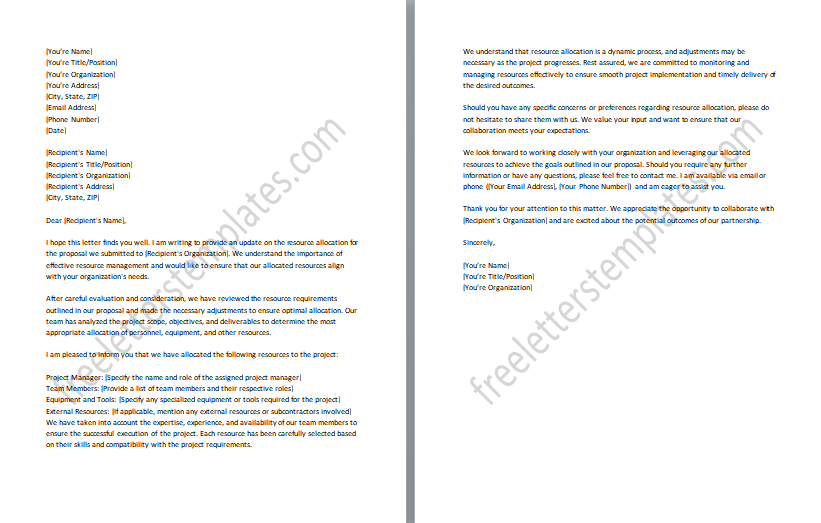
#27: Discussion on Marketing Strategy:
The purpose of the “Discussion on Marketing Strategy in the Proposal Follow-up Letter” is to initiate a conversation with the recipient regarding the proposed marketing strategy outlined in the submitted proposal. The letter acknowledges the recipient’s interest in the proposal and expresses the sender’s eagerness to discuss and further refine the marketing strategy. It aims to schedule a meeting or call to delve deeper into the proposed marketing approaches, target audience, messaging, or any other relevant aspects. The letter may highlight specific areas for discussion or invite the recipient to share their insights and suggestions to enhance the marketing strategy’s effectiveness. The tone of the letter is collaborative, open-minded, and focused on fostering a productive dialogue to develop a strong marketing plan that aligns with the recipient’s goals and objectives.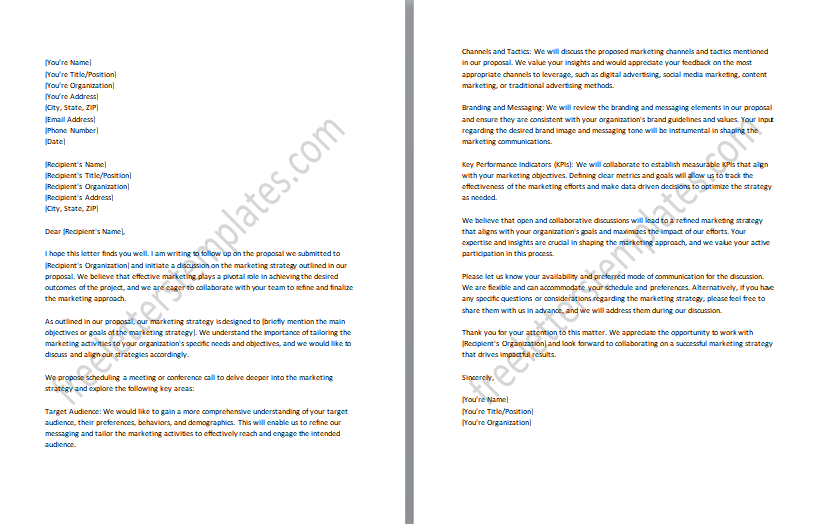
#28: Request for Product Prototype the Proposal:
The purpose of the “Request for Product Prototype in the Proposal Follow-up Letter” is to formally request the recipient to provide a product prototype as part of the proposed project outlined in the submitted proposal. The letter acknowledges the recipient’s interest in the proposal and expresses the sender’s need for a prototype to evaluate and assess its feasibility or functionality. It aims to specify the requirements or specifications for the prototype, including desired features, design elements, or any specific testing criteria. The letter may also outline the deadline or timeline for the prototype submission and provide instructions for delivering or sharing the prototype. The tone of the letter is professional, specific, and focused on obtaining a tangible prototype that will aid in the project’s evaluation and decision-making process.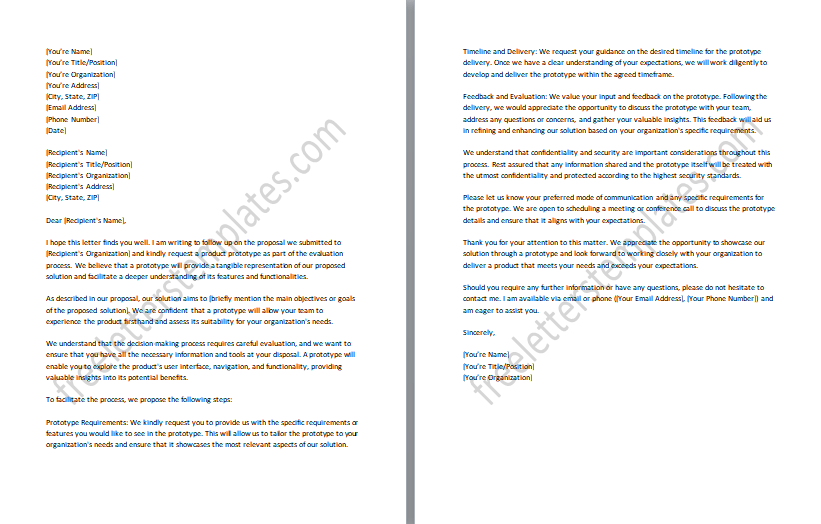
#29: Confirmation of Vendor Selection:
The purpose of the “Confirmation of Vendor Selection in the Proposal Follow-up Letter” is to officially confirm the selection of a vendor or supplier for the proposed project outlined in the submitted proposal. The letter acknowledges the recipient’s participation in the proposal process and expresses appreciation for their submission. It aims to notify the recipient that their organization has been chosen as the selected vendor for the project. The letter may include details about the selection criteria, reasons for the decision, and any additional steps required for contracting or finalizing the agreement. It emphasizes the sender’s confidence in the recipient’s capabilities and their commitment to working together successfully. The tone of the letter is professional, congratulatory, and focused on establishing a positive vendor-client relationship for the project’s successful execution.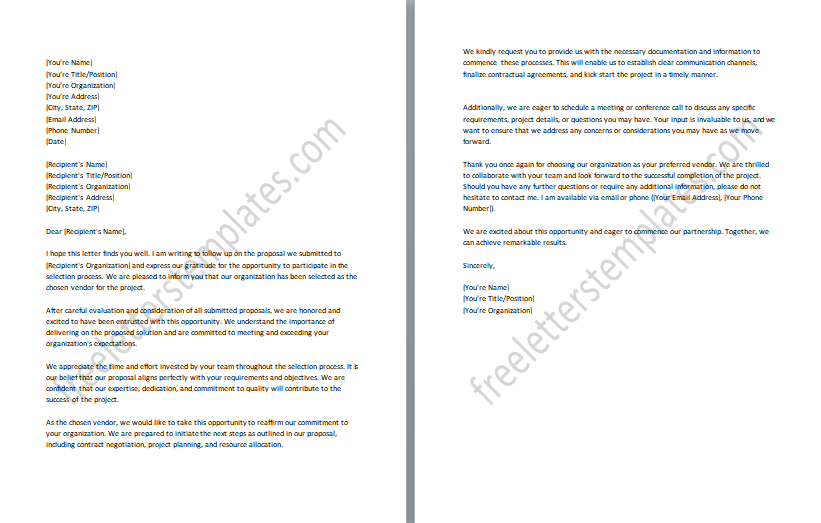
#30: Partnership Agreement Terms Confirmation:
The purpose of the “Partnership Agreement Terms Confirmation Follow-up Letter” is to confirm the agreed-upon terms and conditions of a partnership agreement discussed in the submitted proposal. The letter acknowledges the recipient’s active participation in the partnership negotiation process and expresses appreciation for reaching a consensus on the terms. It aims to provide written confirmation of the finalized partnership agreement, including key provisions, responsibilities, obligations, and any specific terms related to the collaboration. The letter may also highlight important dates, such as the effective date of the agreement or any milestones for implementation. It emphasizes the sender’s commitment to the partnership’s success and their confidence in the mutually beneficial nature of the agreed-upon terms. The tone of the letter is professional, formal, and focused on establishing clarity and transparency in the partnership agreement.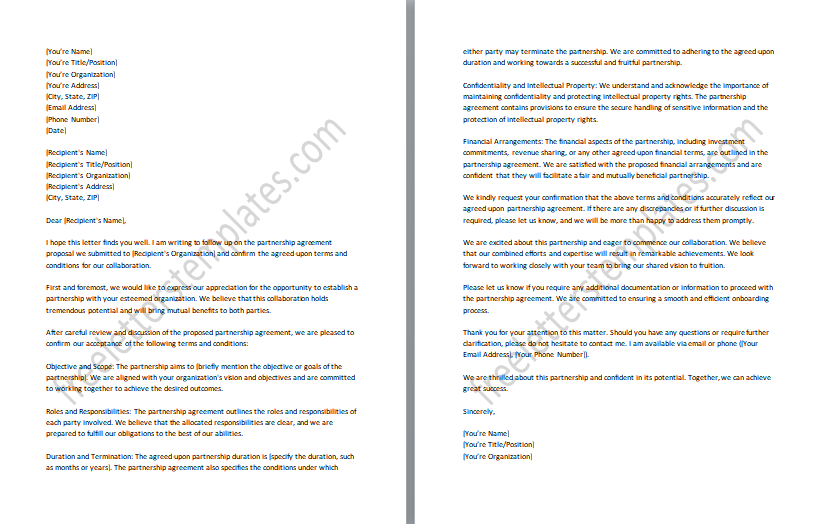
#31: Grant Application Status Inquiry for the Proposal:
The purpose of the “Grant Application Status Inquiry for the Proposal Follow-up Letter” is to inquire about the current status of a grant application that was submitted as part of the proposal. The letter acknowledges the recipient’s receipt of the grant application and expresses the sender’s interest in obtaining an update on its evaluation or review process. It aims to seek information regarding the progress, any decision timelines, or any additional steps required from the sender’s end. The letter emphasizes the sender’s eagerness to receive an update to plan their next steps accordingly and highlights the importance of the grant application outcome for the proposed project. The tone of the letter is polite, inquisitive, and focused on obtaining a clear understanding of the grant application’s status, ensuring effective communication and timely responses between the sender and the recipient.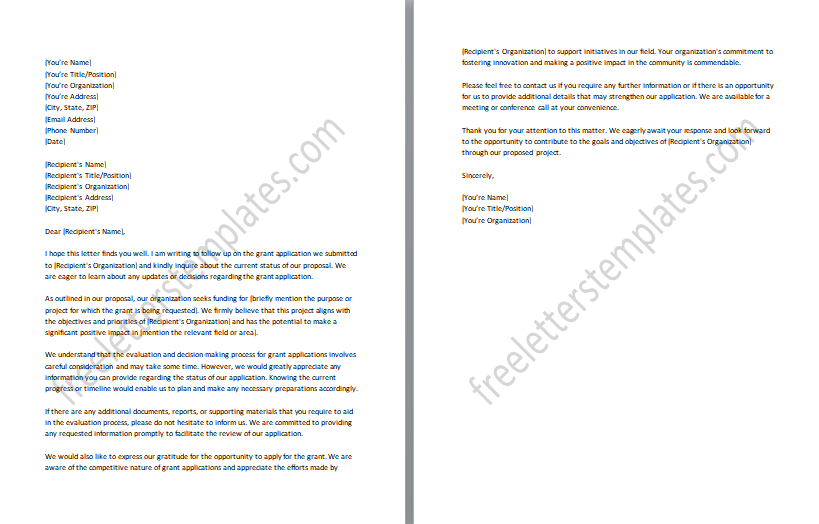
#32: Request for Client Testimonial on Proposal Success Letter:
The purpose of the “Request for Client Testimonial on Proposal Success Letter” is to formally request a testimonial from a client or customer regarding the success of a proposal or project. The letter acknowledges the recipient’s collaboration and expresses appreciation for their involvement in the proposal or project. It aims to request a testimonial that highlights the positive outcomes, benefits, or experiences resulting from the implemented proposal. The letter may suggest specific areas or aspects that the testimonial can focus on, such as the quality of service, the impact on their business, or the satisfaction with the results achieved. It emphasizes the importance of client feedback and testimonials in showcasing the effectiveness and value of the proposal to potential future clients or stakeholders. The tone of the letter is professional, appreciative, and focused on encouraging the recipient to share their positive experiences to support the proposal’s success.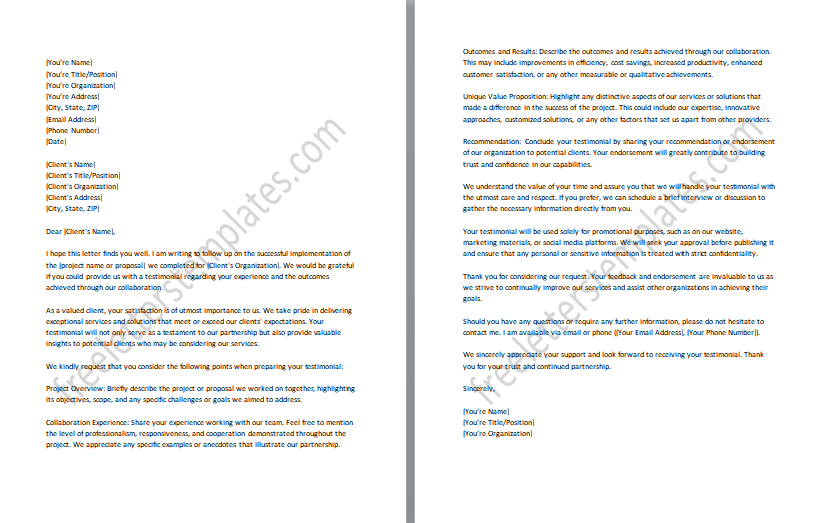
Common Mistakes to Avoid in Follow-up Letters
- Being Overly Pushy: Avoid coming across as too aggressive or desperate in your follow-up letter. Maintain a professional and courteous tone while expressing your interest or seeking a response.
- Using Generic Templates: Steer clear of using generic templates that lack personalization. Tailor your follow-up letter to the specific recipient and situation to demonstrate genuine interest and attention to detail.
- Neglecting to Personalize the Message: Take the time to personalize your follow-up letter by referencing specific details from previous interactions or discussions. This shows that you value the recipient and their unique circumstances.
- Failing to Provide Value: Ensure that your follow-up letter offers something of value to the recipient. Whether it’s additional information, clarification, or a proposal revision, make it clear how your follow-up benefits them and addresses their needs.
- Ignoring Proper Formatting and Proofreading: Pay attention to the formatting and structure of your follow-up letter. Use clear headings, paragraphs, and bullet points to enhance readability. Additionally, proofread your letter thoroughly to eliminate any spelling or grammatical errors.
- Sending Follow-ups Too Frequently: Avoid bombarding the recipient with excessive follow-up letters or emails. Give them adequate time to respond before sending a polite and considerate follow-up.
- Neglecting to Follow-Up at All: On the other hand, failing to follow up at all can also be a mistake. Follow-up letters are crucial in keeping communication alive and demonstrating your commitment to the proposal. Be proactive and timely in your follow-up efforts.
- Overlooking Professionalism: Maintain a professional tone throughout your follow-up letter. Avoid using informal language, slang, or overly casual expressions. Maintain a respectful and polished demeanor.
- Lacking Clarity and Conciseness: Be clear and concise in your follow-up letter. Clearly state the purpose of the follow-up, provide relevant details, and articulate your expectations or desired outcomes. Avoid lengthy or convoluted sentences that may confuse the recipient.
- Neglecting to Follow-Up on Follow-ups: If you’ve already sent a follow-up letter or email, make sure to follow up on that follow-up if you haven’t received a response. Demonstrate your persistence and dedication to open lines of communication.
Conclusion:
In conclusion, on this page, we are committed to providing you with the tools and resources necessary to excel in your proposal follow-up efforts. Our professionally crafted letter templates, along with valuable tips and strategies, empower you to effectively communicate, avoid common mistakes, and nurture strong relationships with clients and stakeholders. We are here to support you on your journey to success, and we invite you to explore our collection of follow-up letters and elevate your follow-up game today. Thank you for choosing Proposal Follow-up Letters as your trusted resource.